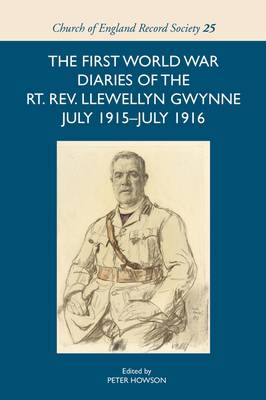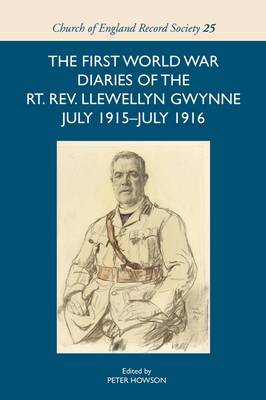
- Afhalen na 1 uur in een winkel met voorraad
- Gratis thuislevering in België vanaf € 30
- Ruim aanbod met 7 miljoen producten
- Afhalen na 1 uur in een winkel met voorraad
- Gratis thuislevering in België vanaf € 30
- Ruim aanbod met 7 miljoen producten
Zoeken
The First World War Diaries of the Rt. Rev. Llewellyn Gwynne, July 1915-July 1916
€ 97,95
+ 195 punten
Omschrijving
The Right Reverend Llewellyn Gwynne's diaries offer a unique insight into a period of change for the army, chaplains and the Church of England during a critical period of the First World War. Few men spent the whole of World War One serving in the British Expeditionary Force, from its initial deployment in August 1914 to its demobilization in February 1919. One who did was the Right Reverend Llewellyn Gwynne, the bishop of Khartoum. On leave in London in the summer of 1914, he persuaded the archbishop of Canterbury that his experience with troops in the Sudan made him an ideal candidate for a temporary commission as a chaplain. Gwynne went to France with a Hospital and then, in December 1914, was transferred to a Field Ambulance in the front line. During July 1915, he was summoned back to London to be told that he was now the Deputy Chaplain General and thus responsiblefor the oversight of all Anglican chaplains. An inveterate diarist, Gwynne kept a detailed record of his life as a unit chaplain and how he managed the transition to high office in the Army Chaplains' Department. The diaries arepreceded by an introduction that discusses the work and organisation of Anglican chaplains in the department and how Gwynne came to have the role in it that he did. Together, they offer a unique insight into a period of change forthe army, chaplains and the Church of England during a critical period of the war. The Rev. Dr PETER HOWSON is a Methodist Minister who had a career as an army chaplain before turning to research. He is the author of Muddling Through: The organisation of British army chaplaincy in the First World War and is the Secretary of the Society for Army Historical Research.
Specificaties
Betrokkenen
- Uitgeverij:
Inhoud
- Aantal bladzijden:
- 203
- Taal:
- Engels
- Reeks:
- Reeksnummer:
- nr. 25
Eigenschappen
- Productcode (EAN):
- 9781783273966
- Verschijningsdatum:
- 17/05/2019
- Uitvoering:
- Hardcover
- Formaat:
- Genaaid
- Afmetingen:
- 152 mm x 236 mm
- Gewicht:
- 589 g

Alleen bij Standaard Boekhandel
+ 195 punten op je klantenkaart van Standaard Boekhandel
Beoordelingen
We publiceren alleen reviews die voldoen aan de voorwaarden voor reviews. Bekijk onze voorwaarden voor reviews.










